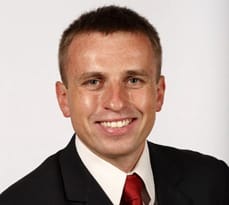The typical picture of investment banking – unforgiving hours and relentless pressure – means it’s not a job for the faint-hearted. But for those ready to accept the challenge, the rewards, intellectual and financial, can be massive. Our experts lift the lid on what it means to do well in this sector, and how to use an MBA to make it happen.

The industry expert – Roger Howgego
A financial services consultant who has worked for Lehman Brothers, Morgan Grenfell and Orion Bank, Roger gives specialist coaching to Cambridge MBA students as part of their career development programme.
What’s so great about investment banking?
This isn’t a hobby or something to dabble in – it’s a vocation. Investment banking is constant hard work in a consistently highly pressurised environment. And you have to be prepared that when you reach senior level, there are a lot of egos to deal with! Everyone is aware of the bad: the pressure; tough deadlines; volatile, unpredictable drivers (equity markets, interest rate markets, fixed income markets that never stop so you can’t either) and horrendous working hours – 120-hour weeks are not uncommon and investment bankers often go 24-48 hours without sleep. You have to be sharp, constantly aware of the changing conditions to enable you to complete deals. It’s mentally, physically and emotionally exhausting. But there’s the good too: if you can withstand the pressure, investment banking is very highly paid. Another upside is the buzz you get from constantly working with very smart people.
Do I have what it takes?
Naturally, banking wants first class academics and those hiring would be looking for a GPA (grade point average) in excess of 3.4 or 3.5. They are looking for raw intelligence. But your first degree doesn’t have to be in economics – if not, it’s likely to be a quantifiable degree such as engineering and physics, but they don’t rule anyone out. A philosophy graduate, for example, has not worked with numbers but has proved an analytical ability. What they do want is tenacity, flexibility, strong analytical and problem-solving skills -and most importantly of all, exemplary communication skills and emotional intelligence. You need to be able to read and understand people to do an effective deal.
What should I do next?
An MBA is one of the most logical ways into the profession. There are three typical profiles of an investment banking MBA applicant: they’re already working for one of the big four – KPMG, PricewaterhouseCoopers, Ernst & Young and Deloitte – or one of the large management consultancies such as McKinsey or The Boston Consulting Group (BCG), or they come from the industry sector with knowledge of strategy and operations. But a lot of people from the public sector also do very well – if your clients are all big corporates, your experience with them will have given you knowledge of how they work. At MBA level the early days are in researching and valuing companies, working on “pitch books” to present to prospective clients, perhaps supervising junior analysts and generally understanding market dynamics and world events affecting these markets.
Been there, done that – Lukasz Laski (Cambridge MBA 2010)
Lukasz Laski was a structural engineer when he decided to undertake an MBA. After his MBA, he’s now an associate at a major European Investment Bank.

What’s the story?
I was designing bridges with an advisory role on infrastructure and I realised infrastructure is an asset for investors to put their money into. I also had a strong feeling I wanted to work in investment. I understood how infrastructure worked but I lacked the appropriate financial knowledge, so I looked for an MBA.
Did the MBA help you make the switch?
I learned what I wanted to be, and it helped me determine that this was the right career path. The networking was invaluable in helping me get my first job in a Japanese bank. The MBA also enabled me to look at problems from a broader perspective – and it gives you the chance to work with people equal or better than you, which enables you to develop. The course taught me a lot of hard skills, things like corporate finance. I had been a leader before coming to Cambridge Judge but learned to systemise my knowledge. I was very impressed with the Finance Concentration on the MBA (a specific packages of courses and projects run by specialist coaches) which included an elective on infrastructure finance. The other very valuable part of the course was the Global Consulting Project, in which I was able to spend a month in India researching the state of the Indian infrastructure market. My team then presented our findings to government ministries.
How will it help me find my new career?
The networking plays a massive part. As well as connecting with your peer group, the Cambridge’s college system broadens the networks further – you come into contact with so many people from different backgrounds with such a broad range of experience. I got my first job through a fellow member of the boat club. Having an MBA doesn’t get you the job in itself, but it gives you a seat at the table. Some of the skills you may not put to immediate use, but they are more of a long-term investment. It’s like carrying a set of tools. Some you don’t use for years but when you do need them, you’ve got them.
The careers expert – Shelley Hogg
Shelley Hogg is Head of Career Development on the Cambridge MBA programme.

How will the programme help me switch?
Our career development programme helps our students research and plan their careers after their MBA. We help them with self-assessment, to identify their strengths – we do a lot of work with them on their personal brand. Some come with a plan and very definite ideas of where they want to be but are not sure how to get there. But many other people come to the MBA because they want to explore changing direction but have no definite idea of where they want to be. Our programme helps them to identify that and implement their structured career plan. But even with the ones who definitely know what they want to do, we encourage them to have more than one plan.”
What can I expect the programme to look like?
The aim is for students to create a structured career search strategy. Each student is immediately allocated an adviser and has regular in-depth, individual coaching with one of our Career Development Managers. We also do group practice, where students give a two-minute pitch to an adviser but also two other MBA students. The peer feedback is really valuable – and often very direct! Our students have such a range of ages, sectors, experience, cultures and nationalities – this peer feedback offers perspectives you’d find hard to get from just one person. We also work with partners in a range of industries who lead workshops and other programmes to advise our students on the market.
What’s the best thing about it?
As Lukasz says, the networking is a huge benefit of coming to Cambridge. You gain the knowledge and skills through the MBA curriculum, with options to specialise in finance, but you’ve got to know where to find the jobs at the end. So we help students know how to access the “hidden market” – 80 per cent of job opportunities are never advertised. Much of this access is gained through networking and at Cambridge such opportunities are immense. As well as the diversity of their course peers, MBA students have access to all 850 University of Cambridge societies – including most relevantly for student bankers, finance groups including the Cambridge University Finance and Investment Society, which has more than 2,000 members.

